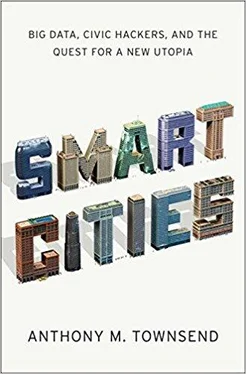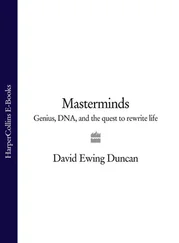Since we had last spoken, I’d thought often about Germany’s parking app fiasco. As much as I believed that the organic approach to smart-city innovation was better in the long run, Haselmayer’s story had raised serious concerns about the wisdom of building smart city technology locally. I’d embraced the notion of civic laboratories as factories for situated software, of quirky local apps, and infrastructures that put a unique local spin on technology. Twenty years of studying cities told me that building small, local, and human-scale was always better. But his research showed that most cities didn’t actually have the capacity to create good apps. Perhaps I hadn’t appreciated how hard it is for good technology to spread and take root where it was needed.
Haselmayer s slant on situated software cuts across geography instead of rooting itself in individual places. “There are 557,000 local governments in the world,” he told me, “and they just cannot be all different. I’m trained as an urbanist so its not that I reject the idea that every place is unique.” Instead, he saw an opportunity to target “micromarkets,” as he calls them, that don’t present a huge opportunity in one city but are potentially enormous if you can aggregate them globally. “Blind people everywhere have the same problems,” he says, recalling Stockholm’s e-Adept system.
At a sidewalk cafe, I prodded Haselmayer, picking up that thread again. He pulled up CityMart on his iPad. The website lets you travel virtually around the world and see how other cities have solved similar problems. A manager in a city’s parking authority, having identified the need for a mobile payment system, might browse through CityMart’s dozens of showcases from different companies from around the Web. “There’s this romantic public-sector view that you do a study trip, you like the ideas, and then you go home and do the same thing,” he said. This was the main way that ideas spread before the Web was invented. “This is not so cities can exchange best practices,” he told me, pointing at CityMart on the iPad. There are already lots of international organizations that ply a rich trade in urban-planning case studies. “It is so cities can exchange contractors.” His goal is for the site to eventually house five thousand companies offering technology solutions for every urban problem under the sun.
CityMart should help speed the spread of smart-city technologies. Potentially, it could transform the industry, making it less top-heavy and less dominated by global firms like IBM, Cisco, and Siemens. It’s less clear whether it will do much about the “not invented here” problem. If it does truly create a new global trade in smart city solutions, local officials may be under more pressure than ever to make sure their dollars go to local firms that could themselves use CityMart for a real shot at larger success.
My phone buzzed with directions to my next appointment. That evening I was using Barcelona’s cafes and bars as a kind of virtual conference center, all coordinated through my Foursquare social graph. Haselmayer offered his cynical view of the smart-cities industry, which had gathered in Barcelona for one of its biggest global trade shows to date. “The debate on smart cities has become all about [technical] architecture, where IBM says a smart city is nothing else but a corporation, and you need a good kind of architecture and then everything happens. That is an unrealistic view of how a city works, and it’s a monolithic approach. They are saying that you don’t prioritize by deploying services, you prioritize by building yet another municipal industrial-scale infrastructure. Once you’ve got this, then everything is possible.”
He pushed a copy of his book across the table. I flipped through the evidence for his case, a painstaking accounting of billions of euros of public monies wasted on useless apps. “Where are the services that can change our lives?” the jacket asks. For citizens of the world’s emerging smart cities, it’s the right question. But as Bill Clinton has said, “Nearly every problem has been solved by someone somewhere. The challenge of the twenty-first century is to find out what works and scale it up.”31
The Long Hack
The Summer of Love was a rejection of the material abundance of America’s new middle class. The hippies of the Haight questioned the very foundations of capitalist society—property, marriage, and even government itself. They abhorred industrial systems of production, and tried to re-create local alternatives. Similarly, in an ideal world, we’d craft vernacular technologies to meet the unique needs of every smart city using only the materials at hand locally. We’d slow down and open up the design process, to ensure maximum participation by the people who will live with them for a century to come. This is what Summer of Smart was after.
Unfortunately, we don’t have the time to tailor a bespoke set of smart technologies for every city. Many are growing much too rapidly for that organic process to play out, while others slip speedily into decline. Technology is evolving even more rapidly, creating new tools to address these problems and rapidly making the old solutions obsolete. If we are to realize the opportunity smart technologies present, global industry has to play a role. Grassroots movements can be innovative and powerful, but just as often they are slow, factionalized, disorganized, and disorderly. A half-decade after Washington, DC, opened up the first municipal open-data store, according to my calculations, less than 6 percent of the US population lived in a place that had one. And the diffusion of new ideas to small cities and those in the global south is not happening fast enough. Smart is still mostly a big-city phenomenon.
This frustratingly slow pace of progress is fueling a growing urge to create standards for smart cities. How will a buildings systems talk to each other? How can my phone ask a bus where it is going? Companies like Living PlanIT, based in London, talk openly about their ambition to develop an “urban operating system.” But the engineering challenge of making all the varied pieces of technology in a city work together, as enormous as they are, is just the first baby step in rationalizing the design of the smart city. Already a consortium of cities led by Barcelona (with a strong Cisco presence) convened in 2012 to start work on a “City Protocol,” which aims to create not only technical standards but also a common language to describe “the anatomy, the functions and the metabolism of a city” and performance indicators to measure and benchmark them.33
A common new starting point for building smart cities will speed the diffusion of good ideas and technology. But in the rush to set standards, we should heed the lessons of those early struggles over the Internets DNA that we explored in chapter 3. For if the lessons of these civic laboratories and the situated software they generate tell us anything, it is to be careful how much structure we impose from the top down. The Internets development shows how the combinatorial approach to innovation, though by nature incremental, can add up to big breakthroughs that quickly scale planet-wide. The endless variety of pilots, prototypes, and experiments popping up across the globe demonstrates that this style of combinatorial innovation is alive and well in the realm of smart cities. Every day, tinkerers around the world are showing that smart technologies are a very different beast than mere urban utilities. They are complex assemblages crafted to solve the everyday needs of small groups of people. With luck, just like the Web, over time these small, localized advances will add up to big positive changes in how we all live and work. Perhaps we should hold our options open a bit longer and resist the urge to standardize too much.
Читать дальше












